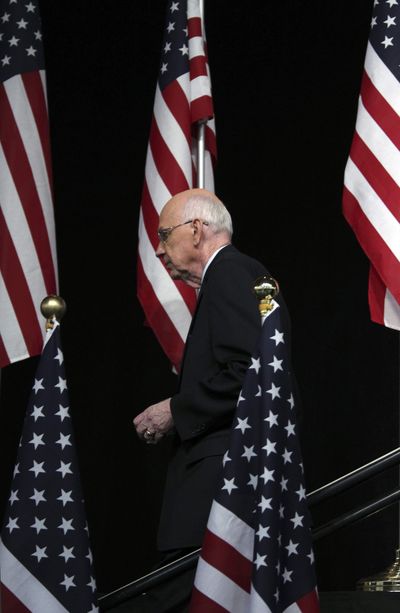GOP senator’s loss signals conservatives’ frustration
Backlash against health reform, bailout provokes upset in Utah

SALT LAKE CITY – Republican Sen. Bob Bennett was defeated in his bid for re-election Saturday by delegates at the Utah GOP convention in a stunning defeat for a once-popular three-term incumbent who fell victim to a growing conservative movement nationwide.
Bennett’s failure to make it into Utah’s GOP primary makes him the first congressional incumbent to be ousted this year and demonstrates the challenges candidates face from the right in 2010.
“The political atmosphere obviously has been toxic, and it’s very clear that some of the votes that I have cast have added to the toxic environment,” Bennett told reporters, choking back tears.
Bennett didn’t answer questions after his loss, but he told the Associated Press earlier Saturday that he wouldn’t rule out a write-in candidacy. State law prohibits him from running as an independent.
Bennett survived a first round of voting Saturday among roughly 3,500 delegates but was eliminated when he finished a distant third in the second round. He garnered just under 27 percent of the vote, while businessman Tim Bridgewater had 37 percent, and attorney Mike Lee got 36 percent. Lee and Bridgewater will face each other in a June 22 primary after a third round of voting in which neither got the 60 percent necessary to win outright.
“Don’t take a chance on a newcomer,” Bennett had pleaded in his brief speech to the delegates before the second round of voting began. “There’s too much at stake.”
Yet that urging, and Bennett’s endorsements by the National Rifle Association and former presidential candidate Mitt Romney, did little to stave off anger toward the Washington establishment from delegates.
“The bailout bothers me. That in and of itself is unforgivable in my opinion,” said delegate Scott White, a 58-year-old general contractor from Taylorsville.
Bennett, 76, initially faced seven Republican opponents who said he wasn’t conservative enough for ultraconservative Utah.
Opposition to Bennett couldn’t be chalked up solely to anti-incumbency fervor.
Neither of Utah’s two Republican congressmen were at risk of losing their seats, and Republican Gov. Gary Herbert easily won his party’s nomination. Last week, voters in primaries in North Carolina and Ohio retained their incumbents, while those in Indiana turned to a former senator – Republican Dan Coats.
Bennett was under fire for voting to bail out Wall Street, co-sponsoring a bipartisan bill mandating health insurance coverage and for aggressively pursuing earmarks.
Some delegates, who tend to be more conservative than other Utah Republicans, were also upset he’s still in office after promising to serve only two terms when first elected in 1992.
“I think he’s lost touch,” said delegate Gary Crofts. “I’m excited to get a new person in there and fire things up a little.”
Recently, Bennett has said part of his problem with delegates has been that he doesn’t go on conservative cable talk shows and offer angry sound bites. Instead, he said he likes to work on finding practical solutions.
Utah’s unique nominating process also played a critical role in his defeat. The 3,500 delegates wield enormous power and can decide the fate of entire elections in a state of nearly 3 million. The winner of the Republican race is all but guaranteed victory in November over Democratic nominee Sam Granato because Utah is so overwhelmingly GOP.
Bennett’s defeat is the latest in a series of surprising political developments in a year in which the tea party movement has amassed growing power.
In January, then-little-known Republican Scott Brown won the Massachusetts Senate seat long held by the late Edward Kennedy. Several incumbents from both parties have opted not to seek re-election as they face difficult challenges, and GOP Florida Gov. Charlie Crist recently opted to run as an independent in his Senate bid rather than face defeat at the hands of his own party.